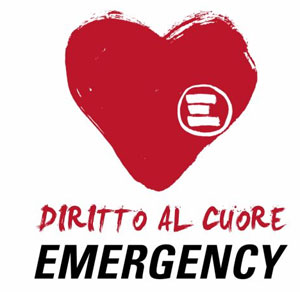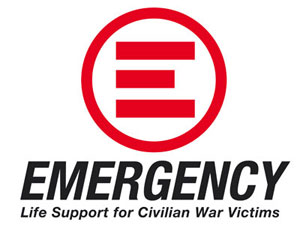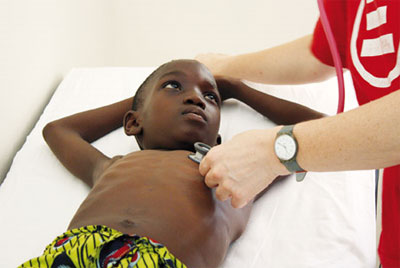 On the banks of the Nile, a red and white building, surrounded by a lush garden, is the only thing that stops the sand-colored landscape that makes even for miles the landscape. The streets, houses, cars, many with attached wagon mules, clothing and rare plants ... everything is yellow ocher. The color of the sand of the desert. On the banks of the Nile, a red and white building, surrounded by a lush garden, is the only thing that stops the sand-colored landscape that makes even for miles the landscape. The streets, houses, cars, many with attached wagon mules, clothing and rare plants ... everything is yellow ocher. The color of the sand of the desert.
Khartoum is the capital city in the desert of Sudan. Emergency has built here, "Salam Centre", a center of excellence for treating heart disease. The only free center ... in Sudan all health care is private. You pay for everything: medicines, blankets, meals ... everything. The Salam Centre accepts patients from 16 countries, mostly children. I am a cardiac technician and I worked there for 6 months.
The work is the same as I do every day at Bologna, but everything else is a bit different ... a lot different. First, the language, Salam we speak English with colleagues and patients. I spend most of the day in the hospital, the rest in a pseudo-collective house with other international volunteers. The hospital is a jewel, the structure is brand new, technological and iper-clean.
The non-professional staff is local. There are gardeners who look after the garden making it spectacular, we are in the desert!
There are "cleaner" (say janitors) who clean every moment, the problem of sand is not small. There are cooks and cafeteria workers, all with disabilities. In a country like Sudan where life is already difficult for everyone, it would be impossible for them to survive. There are drivers, mechanics, carpenters and tailors (for uniforms and pajamas), all Sudanese who have found a job that allows them to live with dignity. The professional staff is "mixed", both internationally and national (nurses and doctors).
Internationals also play an educational specialist activity to train the local doctors and nurses. Patients ... from early in the morning, outside the gates of the hospital, dozens of people waiting patiently for their turn to be visited ... the first step. They come from far away, even after days and days of travel. In this center are accepted only people with heart deceases… and only those come. The visit, diagnosis, and followed by a operation ...

 A huge yard A huge yard
Whatever happens, the relatives are waiting for you, they give you candy and thank you for what you did. It's almost embarrassing ... The workday is long, tiring but satisfying, you go back "home" tired but serene.
The "home". A few meters from the hospital, in the same green garden, there are about sixty comfortable rooms located along a shady avenue of mangoes, here we International are sleeping.
Mostly Italians, two Englishmen, and several Serbs. Technicians, nurses, doctors and administration are all here. At the end of the avenue of mangoes, a few meters from the flow of the Nile waters, there are the common rooms. The dining room, kitchen, a lounge with TV and library. All the "Cajagia village" (village of the white man) was made from containers that has helped bring everything needed for the construction of the hospital. Local workforce cut, welded and painted the iron boxes for weeks to readjust them to comfortable rooms.
Every night we meet for dinner, the local chefs prepare pasta, salads, omelets, meat and pizza, the food is good and sometimes some of us dedicated to the preparation of some dishes for everyone. After dinner we discuss, or watch a movie to end the day. The collective life is always pleasant and you learn a lot of things. The people I found are very different, almost all Serbs are here on a mission because the salary is better than in their country.
Italians? ... I was very impressed that the majority of the people I found to be practicing Catholics believers. Far away from my ideals, they are a spirit of sacrifice or devotion to people in need. Comrades I have met two surveyors who for years collaborated with Emergency, that confirm to me the significant presence of persons linked to the church.
On Friday we are not working, at least we who are in the operating room, we go around the city. The periphery is an endless desert dotted with huts made of any material and barefoot children playing soccer.
The city is an enormous project, nothing is final. The neon signs of the shopping centers are dusty as everything else, a thin layer of sand covers everything forever. Only the white cars with the United Nations black lettering on the sides, seem to come from a laundry room at that moment. Are new, shiny and lots! Are parked in front of beautiful houses, where they live the "volunteers" and their families. Are parked in driveways of the embassy or of the elegant buildings in the center, where they have their "activities" or of the international restaurants where they pay with the U.N. credit card. It is perhaps, therefore, that at a meeting of the Italian embassy when one of them said: "... but what will they do to the Emergency people all shut inside the fence along the Salam?" And what do they do? I do not know, but all those UN cars are the only thing that made me feel in danger in a country in war led by a bloody King.
 Monia Ghiaroni
Monia Ghiaroni
 Emergency 2 Emergency 2
Emergency in brief
by Nicola Pisu
How it was born, what is proposed, what and how it does.
In today's conflicts, more than ninety percent of victims are civilians. Thousands of women, children, unarmed men are killed each year worldwide. Many more are injured and maimed.
The humanitarian association Emergency NGO non-profit organization founded in Milan in 1994 to provide assistance to these victims, the initiative of a small group of people, including Gino Strada and Teresa Sarti.
Emergency is:
- an Italian private and independent organization. It is open without any political discrimination, ideological or religious to all who share the principles and objectives and support humanitarian activities;
- a completely neutral and non-political organization that provides health care solely on the basis of humanitarian principles;
- a humanitarian organization that brings medical surgery assistance to victims of armed conflicts and those who suffer the social consequences of wars, hunger, poverty and marginalization.
Emergency believes that practicing human rights - in particular the right to be treated when you are injured or sick - is the only way to establish relations of mutual respect and solidarity.
Emergency promotes a culture of peace and solidarity.
Acts building and managing:
- Surgical Centres for those wounded in war, emergencies, trauma and orthopedic;
- Hospitals for specialist assistance;
- Centres for physical and social rehabilitation of landmine victims and other trauma;
- First Aid Posts (FAPs) for immediate treatment of the wounded;
- Health centers for basic medical care.
Also:
- Trains local staff in accordance with criteria and standards of high professional level, in order to make the self-sufficient the structure in which they operate and transfer it to local authorities;
- Implements humanitarian assistance to prisoners in contexts related to situations of conflict;
- Carries out development projects in countries where it operates.
 Just because cures the effects of war, Emergency has committed since its establishment in promoting values of peace, solidarity and respect for human rights. Emergency is or has been present with its activities in Afghanistan, Algeria, Angola, Cambodia, Eritrea, Iraq, Nicaragua, Palestine, Rwanda, Sierra Leone, Sri Lanka, Sudan, Central African Republic. Just because cures the effects of war, Emergency has committed since its establishment in promoting values of peace, solidarity and respect for human rights. Emergency is or has been present with its activities in Afghanistan, Algeria, Angola, Cambodia, Eritrea, Iraq, Nicaragua, Palestine, Rwanda, Sierra Leone, Sri Lanka, Sudan, Central African Republic.
In 2006 Emergency opened in Palermo a clinic that provides health care and social services and basic medicine, pediatrics, dermatology, dentistry, ophthalmology and otolaryngology, obstetrics and gynecology, cardiology, psychiatry and psychology, to migrants with or without a residence permit . From early December 2010 in Marghera was also activated a clinic with similar experience, responding to the progressive and systematic demolition of each civil calendar to which you are witnessing in our country.
Also about the project in Italy in 2005 Emergency organized courses on hygiene, prevention and first aid to prisoners and facing a tuberculosis screening at the New Rebibbia prison complex. Emergency has secured the assistance of medical specialists in some prisons in Lazio. The project was completed in 2007.
Since the inception of its activities in 1994, Emergency is committed to maintain the organization's administrative costs below 10% of the total budget, to maximize the use of financial resources in the statutory objectives, in fact believed to be Emergency that the maximum amount of funds available for the sustenance of the organization in order to respond concretely to the objectives it has set. The low incidence of costs is also due to the valuable work done free of charge to about four thousand volunteers scattered throughout the Italian territory (but not only) and organized in 190 local groups.
The financial resources of Emergency derived almost entirely from private donations and initiatives are the result of the conviction and the willingness of people to support the humanitarian projects of the NGO. The revenue in the year 2009 (latest approved budget) amounted to € 25,407,125.00. Also in 2009 the vast majority of contributors (most of 80%) came from private donors, through individual donations.
In 2009, the cost of the structure stood at 6.10% of funds raised (net of expenses) amounted to € 1,403,719.
21,472,966.00 € are earmarked for operational missions abroad and in Italy. On average, each month, 110 international professionals (doctors, nurses, health workers, technicians, logistics ...) have lent their work in projects of Emergency in the world, joined by about 2,000 local employees.
According to the usual mode that characterizes Emergency, namely to combine the "say" with "doing", an idea developed by Misna (Missionary Service News Agency), gave birth to PeaceReporter (www.peacereporter.net), an online newspaper which deals with international issues and puts the spotlight on the many forgotten conflicts around the globe and the atrocities of the wars against the civilian population. For example, often are the experiences of the International Emergency surgical centers to tell PeaceReporter through the consequences of the "smart " bombing on Afghan villages, the pain of children who jump over the mines, people who see bombs raining in the garden on the roof of the house, in the bazaars, and coming to Emergency hospital (the only present or worthy of such can be held and free of charge) with serious gunshot wounds.
Since 1994, hospitals, clinics and rehabilitation centers were treated free of Emergency over four million people.
 |
Bangui pediatric Center, in the Repubblica Centrafricana |
 Every 2 minutes Emergency cares someone Every 2 minutes Emergency cares someone
Figures containing the first sixteen years of Emergency. But these numbers are not enough to account for the immense work is also important to explain where - in fifteen different countries, battered by war and poverty - and how Emergency has treated those people with passion and professionalism, building and managing hospitals, Surgical centers and pediatric centers, first aid posts, Rehabilitation Centers ...
The reason, however, needs no explanation: quite simply, these people needed it. It's all here, the meaning of the work of doctors and nurses around the world: to treat those who suffer, without distinction of race, ideology, gender, religion.
In March 2009, Emergency has opened a new Pediatric Centre in the capital of Central African Republic, Bangui, which has treated 15,306 children and has worked hard to build the health care network of excellence in Africa. An ambitious project, which aims to encourage cooperation between different countries of the continent in the creation of structures at the highest level, the model of the Salam Center for Cardiac Surgery in Khartoum, and that as the Salam have a regional vocation. Pediatrics, obstetrics and gynecology, oncology, traumatology are just some of the specialties affected by this project, important not only from the clinician. Emergency is convinced that being able to put around the table representatives of several countries, also in conflict with each other, to work on a common goal, which is the health of the population, is also a good result from the cultural point of view.
 byNicola Pisu byNicola Pisu
Voluntary Emergency
Serrenti (Vs) group coordinator)
Emergency 3
An anarchist Emergency voluntary
by Nicola Pisu
In Serrenti in Campidano in the heart of Sardinia, there is a small but very active group of Emergency. For soul is a young anarchist, our friend. We asked him to tell us a bit 'its double militancy.
“How do you feel your being an anarchist, what do you do to feel that?". Is the question that a fellow just met made me one morning recently at the A-editor offices of the anarchist magazine. At the time, the answer I gave him was "I'm an Emergency voluntary". An answer that raised my consciousness in a huge upset, to be used in an instrumental way my membership to Emergency, but also because I was suddenly naked. The minute that preceded the answer, I fell on the knowledge that apart from a lot of sensitivity and affinity with libertarian thought, I abstain in the vote, atheism, being a student of spiritual Faber, congenital anti-militarism, the ecological-environmental sensitivity and other small things, beliefs, character and attention to anti-capitalist-consumerism, I did not know exactly what I did to practice anarchism. Reading A-anarchist magazine and other literature of libertarian thought can be considered an intellectual curiosity, a passion, but to live it, anarchy is something else, and would necessarily mean an attempt to implement it practically, creating the movement from theory to practice, from head to toe. These are points of view, at least this is my, and every friend does it in his own way.
But why work as a volunteer in Emergency is a way for me to live my anarchism?
 No candy No candy
I do not mean to show some kind of theorem, it is not necessary and indeed, I could say I am an anarchist not consistent as it professes, then is a volunteer for an NGO "belonging" to the system that he would "fight ". Perfect, Emergency is not a libertarian circle, Emergency is a humanitarian organization that is part of the system but trying to change a major part, fighting from the inside against the logic of war and trying to implement human rights in health. And it does self-financing, without eating the sweets that this system offers, it does so on their own, breaking away from the logic of party politics, according to those who have identified needs in health and the resources available to carry out an intervention that meets certain basic standards and principles. Emergency is a cooperation that respects the dignity of persons, no charity, but seeks to provide a health quality standards like ours in poor countries, torn apart by war. It does not export a second class health, from waste, what might "be enough"to the third world. It brings technologically advanced Health, the same we that we demand of rich countries. And it does it for free because the access is guaranteed to everyone. In addition, measures shall be training local staff to share knowledge, expertise, experience and professionalism in the medical field, so that it is itself soon to manage the health and medicine in his country. Is this not an attempt to create equality? to implement universal human rights (not because they are written in any official document)? to redistribute wealth? Is not a model that looks to the future?
I think so and this is Emergency, this small humanitarian organization that refusing the logic of war laid the foundations of the world that I want.
Freedom, equality and solidarity are the three principles mentioned by anarchist thought, and my social anxiety is to see them implemented anywhere. To declare them, flag them, denounce their absence, it is important, but not enough. They can not just be key principles, we must, from my point of view, put them into practice, because the project must be after the construction. Emergency deals on their own, independent and neutral and does equality through solidarity. It is my personal belief that there can never be freedom until you first eradicate poverty, hunger, suffering, war that produces these disasters, and overcome the huge economic disparities and inequities that characterize humanity according to the latitude where you live. On the other hand, war is an authoritative tool, which should be ostracized, abandoned as useless and ineffective and would be prejudicial, it is a euphemism for people's lives.
Thus, as previously written, I am an anarchist and also a volunteer to Emergency and I think the two things are not in opposition. Emergency relies on the work of about four thousand volunteers spread throughout the Italian territory, each with their own ideas and political preferences, religious affiliations, different visions of society, who has "A" in his pocket, who Il Manifesto, who La Repubblica, who l'Unita', who Il Corriere. Four thousand talking heads united by the priority objective, which is what is for the Emergency, to implement the equality among the inhabitants of planet Earth and to abolish war.
 Nicola Pisu Nicola Pisu
|

